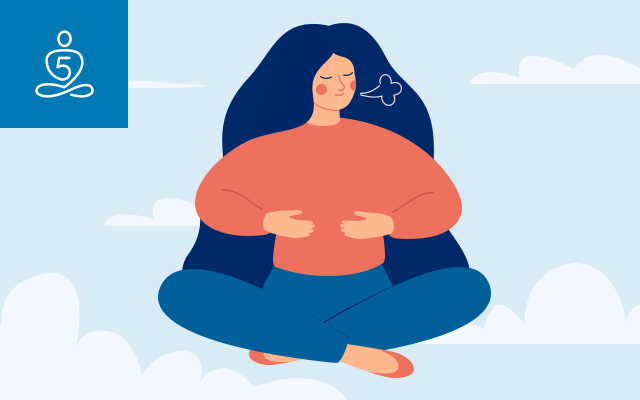Take care of your emotional wellbeing
If you are experiencing thoughts of suicide, a mental health or substance use crisis, or any other kind of emotional distress, call or text 988 for quick access to counseling help.
Mental health is just as important as your physical health, and when you or someone you love is struggling, it’s important to find the right care. We can connect you with resources and treatment options that can help you feel better and live your best life. We also explain ways you can help prevent opioid use disorder among your family.
Where do I start?
A Parent's Guide to Mental Healthcare in RI
This BCBSRI "how-to" guide can help make it easier to find the care your child needs. Learn what signs to look for, what questions to ask, and what resources are available.
Your primary care provider
Start here. Your PCP already knows your overall health and needs. Discuss symptoms and ask for recommendations. However, you do not need a referral from your PCP for counseling or medication.
BCBSRI care managers
Licensed professionals work with you and your providers to get you the services you need. These BCBSRI teams also can review your medicines to make sure you understand why and how to take them. Call them at (401) 459-CARE or 1-800-637-3718 ext. 2273.
BCBSRI Doctors Online
Talk with a therapist or psychiatrist on your phone or computer. Use Doctors Online by logging in to BlueCare Connect so you can manage your health and coverage information all in one place.
- Therapy – for issues such as anxiety, depression, PTSD, and stress. Schedule an appointment online or call 1-800-345-1419.
- Psychiatry – for issues such as anxiety and depression and to evaluate the potential benefits of medication. Schedule an appointment online or call 1-877-410-5548.
BlueCare Connect
BlueCare Connect is your front door to everything healthcare. With a single log-in or phone call, you can access health and wellness apps, plan information, care management, and customer service—and get personalized health support from Care Guides, nurses, and coaches. You also can search for providers in the Find Care section. Log in or register your account.
What programs can help?
This quick guide lists some programs that can help you with:
- Substance use disorders (alcohol and drug)
- Mental health conditions
- Eating disorders
BCBSRI has specifically worked with the programs and providers below to connect our members to important services they provide. This is not an exhaustive list or an endorsement of a particular provider. The information is not a referral or recommendation of any particular healthcare provider, facility, or program.
There are, of course, many other providers you can use, and you can find them in our Find a Doctor tool. You should always confirm the provider’s participation in your plan’s network before receiving services, as provider networks are subject to change.* You’ll also want to ask about the cost to you or check your subscriber agreement in BlueCare Connect for details.
Are you caring for someone who is on Medicare and needs behavioral health support?
Find programs here.
*While BCBSRI works to validate that the information displayed is up to date and accurate, it is subject to change. BCBSRI cannot guarantee availability for the providers or programs listed. Please call the provider prior to scheduling an appointment to verify that the provider continues to be part of your plan's network.
- For: adults and teens
- Treats: substance use disorders
- What to expect: services on your phone, including assessment, virtual care, and doctor-led teams
- Program/provider: Pelago
- Get started: 1-877-349-7755 or visit the Pelago website
- For: adults and children
- Treats: substance use disorders
- What to expect: BCBSRI care managers will help you find coaches from among several peer recovery groups who have lived with mental health, alcohol, and drug conditions
- Provider/program: various peer recovery groups
- Get started: call BCBSRI care managers, 1-800-274-2958
- For: adults at risk for hospitalization or recently hospitalized
- Treats: mental health conditions and substance use disorders
- What to expect: services in your home, over the phone, or at HealthPath offices from a care manager, psychiatrist, therapist, and others
- Provider/program: Butler Hospital HealthPath
- Get started: (401) 415-8868
- For: adults and children
- Treats: eating disorders
- What to expect: intensive outpatient programs; psychotherapy; nutrition; outpatient groups; family support
- Provider/program: BeCollaborative
- Get started: (401) 262-0841
- For: adults and children
- Treats: eating disorders
- What to expect: team-based, family-focused virtual care
- Provider/program: Equip
- Get started: 1-866-858-9125 or visit the Equip website
- For: adults
- Treats: substance use disorders
- What to expect: medication-assisted treatment, care management, counseling
- Provider/program: various providers
- Get started: call BCBSRI care managers, 1-800-274-2958, for help locating an in-network provider
- For: children and families
- Treats: mental health issues
- What to expect: urgent care for those who feel that waiting for an appointment could jeopardize their well-being
- Provider/program: Bradley Hospital, Lifestance, Polaris, Providence Behavioral Health Associates, RICBT, South County Psychiatry
- Get started: call BCBSRI care managers, 1-800-274-2958. After hours call the Kids’ Link RI 24/7 crisis line, 1-855-543-5465.
- For: children and families
- Treats: mental health conditions; members who need additional support to stay safe and stable in the community
- What to expect: individual, family, and group therapy; medication management; home and community-based services; BCBSRI case managers will help you find the right program for you and your family
- Provider/program: Communities for People, Community Care Alliance, Gateway, The Fogarty Center, The Providence Center, Thrive Behavioral Health, UHS of Fuller
- Mobile crisis services – in-home support: Family Serivices of Rhode Island (FSRI), Newport County Mental Health, Tides Family Services
- Get started: call BCBSRI care managers, 1-800-274-2958
- For: adults and children
- Treats: OCD, anxiety, other conditions
- What to expect: virtual matching with therapists and psychiatrists (Headway); virtual therapy and other services
- Provider/program: Headway, Instride, NOCD
- Get started: call BCBSRI at (401) 459-CARE
Note: For all services, please check your Subscriber Agreement to see the amount you pay for visits.
What else can I do for myself or a loved one?
If you’re looking for help for a loved one, BCBSRI care managers may be able to help you find support. Call them at (401) 459-CARE or 1-800-637-3718 ext. 2273.
BH Link
24/7 crisis intervention service. Call (401) 414-LINK (5465) or visit the 24/7 Triage Center at 975 Waterman Avenue in East Providence.
Kids’ Link RI
24/7 crisis line to connect children and youth to care and resources. Call 1-855-543-5465.
What are the different types of care?
Individual behavioral health providers
- Psychiatrist – A medical doctor who specializes in preventing, diagnosing, and treating mental illness. Psychiatrists can prescribe psychiatric medications.
- Psychologist – A licensed, mental health professional trained to work with mild or severe psychological issues. Psychologists do not prescribe medications.
- Counselor – A licensed, mental health professional, such as a social worker, mental health counselor, or marriage and family therapist, who evaluates and treats common life stressors and mild to moderate mood disorders. Counselors do not prescribe medications.
Intensive outpatient programs
- 3 days a week, 3-4 hours a day, for 4-6 weeks (typically). Most are structured so people can continue their normal daily routines.
- Combination of individual and group therapy (family therapy if appropriate) and may include psychiatrist evaluation and medication management.
- Recommended for people who are experiencing emotional and behavioral problems and would benefit from learning how to manage their symptoms and issues in a structured environment.
Partial day hospitalization programs
- 5 days a week, 5 hours a day (typically)
- Combination of individual and group therapy (family therapy if appropriate) and often includes evaluation by a psychiatrist
- Recommended for people who require more intensive treatment than traditional outpatient care, are experiencing serious emotional and behavioral problems, or are at risk for hospitalization as well as for treatment following inpatient hospitalization
Medication-assisted treatment
- Offers structured and intensive services—including medication-assisted treatment, counseling, and care management—to allow members to maintain recovery in a less-intensive treatment program than a hospital setting
- For adult members requiring comprehensive services to facilitate recovery from substance use disorders
Inpatient acute hospital care
- Round-the-clock care in a hospital setting, typically lasts a couple of days
- Daily visits by a team of professionals, including a psychiatrist and group therapy (if appropriate)
- Recommended to stabilize a crisis and/or severe symptoms
Inpatient residential care
- Typically a short-term placement in a residential setting close to a person’s home until they stabilize and can return to the community
- Combination of group, individual, and family therapy
How can I help prevent opioid use disorder?
Here are three ways you can protect yourself and your family:
Ask about alternatives to opioids. If your doctor prescribes opioids after surgery or an injury, talk with your doctor about whether opioids are right for you. Ask your doctor these questions:
- Could non-opioid alternatives relieve my pain?
- What if I have a family history of drug use?
- How long should I take this medication?
See this list for alternatives to opioids for pain relief.
- Take unneeded opioids to a drop-off location. You can help keep opioids out of the hands of others by taking them to a drop-off location. CVS has drop-off boxes, and you can bring opioids to almost all police departments in the state, no questions asked. Find locations at preventoverdoseri.org.
- Talk to your kids about opioids. You can find resources for talking with your kids at the Partnership for a Drug-Free Kids. BCBSRI recently supported PBS and the Rhode Island Student Assistance Services in creating and distributing a curriculum focused on opioid use prevention. You can download the lesson plans for middle school students and high school students.
Doctors Online is a telemedicine service provided by American Well®, an independent company that administers Doctors Online on behalf of Blue Cross & Blue Shield of Rhode Island.
Coverage and cost sharing varies depending on the plan. To see your plan’s specific coverage and costs, please refer to the Subscriber Agreement or contact the number on your member ID card.
This article is provided for informational purposes only and does not constitute medical or other professional advice. It is not an endorsement or recommendation of a particular healthcare provider or treatment program.



